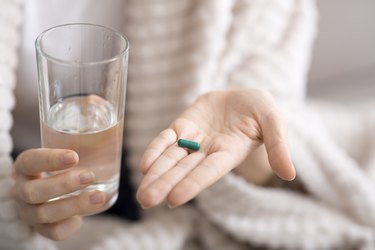
Probiotics are living cultures of microorganisms found in good-for-you foods like yogurt, kefir and kimchi. Probiotics may not only boost the health of the digestive tract, but also help with elimination, meaning they could ease constipation.
What’s Normal Pooping, What’s Constipation
Video of the Day
Constipation is a common digestive issue, affecting millions of Americans each year, according to a January 2013 report in Gastroenterology.
Video of the Day
"Constipation is generally defined as a decrease in frequency of bowel movements," says Gabriel Winberry, MD, a pediatric gastroenterologist and researcher at WakeMed in Raleigh, North Carolina. "Everyone has a baseline number that they go each day." When you go less than what your normal is, that's constipation.
"Ninety percent of people will go at least once every other day," Dr. Winberry says, adding that many people have a bowel movement one to two times a day and the normal tends to be higher for babies and young children. From infancy into the toilet training years, bowel movements are more frequent, and "children ages 1 to 4 might go more like four to six times per day, but this can vary slightly," he says.
Read more: The Best-Rated Probiotics
Can Probiotics Help or Hurt?
Probiotics are foods or supplements that contain live microorganisms like bacteria and yeast. Human bodies are full of bacteria, both good and bad, and consuming probiotics can improve the good bacteria in your body, states the National Center for Complementary and Integrative Health (NCCIH).
According to NCCIH, data from the 2012 National Health Interview Survey show that about 4 million U.S. adults had used probiotics or prebiotics in the past 30 days. Yogurt, kimchi, sauerkraut and other fermented foods are popular sources of these microorganisms, according to the Mayo Clinic.
A lot of probiotics are also sold as dietary supplements. Dietary supplements don't require approval by the U.S. Food and Drug Administration before they are marketed, warns the NCCIH, so always be careful about what you put into your body.
Many people wonder if the beneficial bacteria in probiotics cause constipation. "Generally, probiotics do not cause constipation," says Dr. Winberry. "There's research looking at probiotics to treat constipation actually."
In an October 2014 analysis published in the American Journal of Clinical Nutrition, researchers reviewed 14 studies on probiotics and found that probiotics increased stool frequency by 1.3 bowel movements a week and also softened stools, making them easier to pass.
"Probiotics might bring helpful bacteria to help intestines work a little more effectively," says Dr. Winberry. "But there's not a lot of good science on it, and there's a mixture of opinions."
Read more: 12 Foods High in Probiotics for Better Gut Health
What Else Could Be Causing My Constipation?
Chances are that probiotics aren't the cause of your constipation. Common causes of constipation are lack of fiber and fluids, not enough physical activity and poor stress management, according to the Mayo Clinic.
"Especially in kids, the majority of causes are dietary and behavioral," says Dr. Winberry. "It's functional constipation. This means that the bowel is healthy and everything is functioning fine, but there is a disconnect in what's going on. Sometimes people do not want to go to the bathroom in a social setting or at school. Only a small percentage is caused by anatomic reasons or medications."
To stay on track with your bowel movements, Dr. Winberry has some advice. "In general, increasing your fiber changes the type of bacterial balance in your intestines," he says. "Folks who have more fiber have bacteria that's helpful for staying regular."
Although constipation isn't usually a sign of a more serious health condition, it can be. Because of this, it's always best to see a doctor if you have any concerns. "If you're experiencing significant abdominal pain when trying to go to the bathroom, weight loss or blood, those are reasons to seek medical attention," says Dr. Winberry. "Any distressing symptoms that are affecting your daily routine are red flags."
- Gastroenterology: “American Gastroenterological Association Technical Review on Constipation.”
- National Center for Complementary and Integrative Health: “Probiotics: What You Need to Know.”
- Mayo Clinic: “What are probiotics and Prebiotics?”
- Mayo Clinic: "Constipation"
- The American Journal of Clinical Nutrition: “The Effect of Probiotics on Functional Constipation in Adults: a Systematic Review and Meta-Analysis of Randomized Controlled Trials”
- Gabriel Winberry, MD, pediatric gastroenterologist, researcher, WakeMed, Raleigh, North Carolina
- NCCIH: "Use of Complementary Health Approaches in the U.S. - National Health Interview Survey"
Is this an emergency? If you are experiencing serious medical symptoms, please see the National Library of Medicine’s list of signs you need emergency medical attention or call 911.